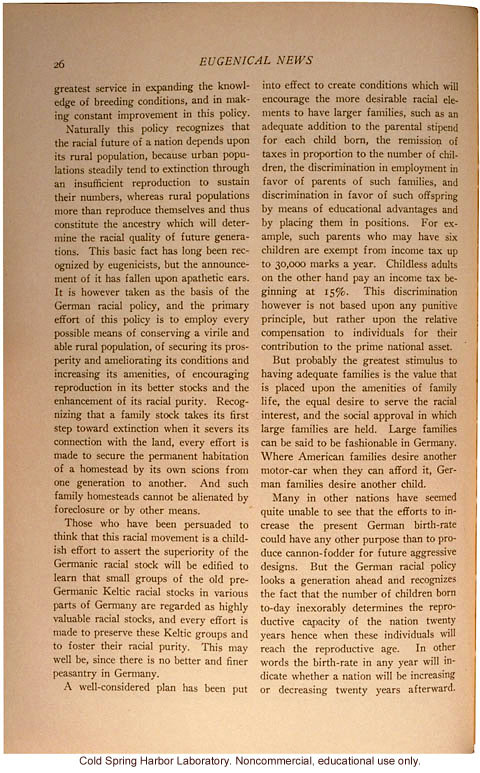"The German Racial Policy," by C.G. Campbell, Eugenical News (vol.21:2) (1)

"The German Racial Policy," by C.G. Campbell, Eugenical News (vol.21:2) (1)
1907. 26 Eugenical News greatest service in expanding the knowledge of breeding conditions, and in making constant improvement in this policy. Naturally this policy recognizes that the racial future of a nation depends upon its rural population, because urban populations steadily tend to extinction through an insufficient reproduction to sustain their numbers, whereas rural populations more than reproduce themselves and thus constitute the ancestry which will determine the racial quality of future generations. This basic fact has long been recognized by eugenicists, but the announcement of it has fallen upon apathetic ears. It is however taken as the basis of the German racial policy, and the primary effort of this policy is to employ every possible means of conserving a virile and able rural population, of securing its prosperity and ameliorating its conditions and increasing its amenities, of encouraging reproduction in its better stocks and the enhancement of its racial purity. Recognizing that a family stock takes its first step toward extinction when it severs its connection with the land, every effort is made to secure the permanent habitation of a homestead by its own scions from one generation to another. And such family homesteads cannot be alienated by foreclosure or by other means. Those who have been persuaded to think that this racial movement is a childish effort to assert the superiority of the Germanic racial stock will be edified to learn that small groups of the old pre-Germanic Keltic racial stocks in various parts of Germany are regarded as highly valuable racial stocks, and every effort is made to preserve these Keltic groups and to foster their racial purity. This may well be, since there is no better and finer peasantry in Germany. A well-considered plan has been put into effect to create conditions which will encourage the more desirable racial elements to have larger families, such as an adequate addition to the parental stipend for each child born, the remission of taxes in proportion to the number of children, the discrimination in employment in favor of parents of such families, and discrimination in favor of such offspring by means of educational advantages and by placing them in positions. For example, such parents who may have six children are exempt from income tax up to 30,000 marks a year. Childless adults on the other hand pay an income tax beginning at 15%. This discrimination however is not based upon any puinitive principle, but rather upon the relative compensation to individuals for their contribution to the prime national asset. But probably the greatest stimulus to having adequate families is the value that is placed upon the amenities of family life, the equal desire to serve the racial interest, and the social approval in which large families are held. Large families can be said to be fashionable in Germany. Where American families desire another motor-car when they can afford it, German families desire another child. Many in other nations have seemed quite unable to see that the efforts to increase the present German birth-rate could have any other purpose than to produce cannon-fodder for future aggressive designs. But the German racial policy looks a generation ahead and recognizes the fact that the number of children born to-day inexorably determines the reproductive capacity of the nation twenty years hence when these individuals will reach the reproductive age. In other words the birth-rate in any year will indicate whether a nation will be increasing or decreasing twenty years afterward. [end]
- ID: 11822
- Source: DNALC.EA


